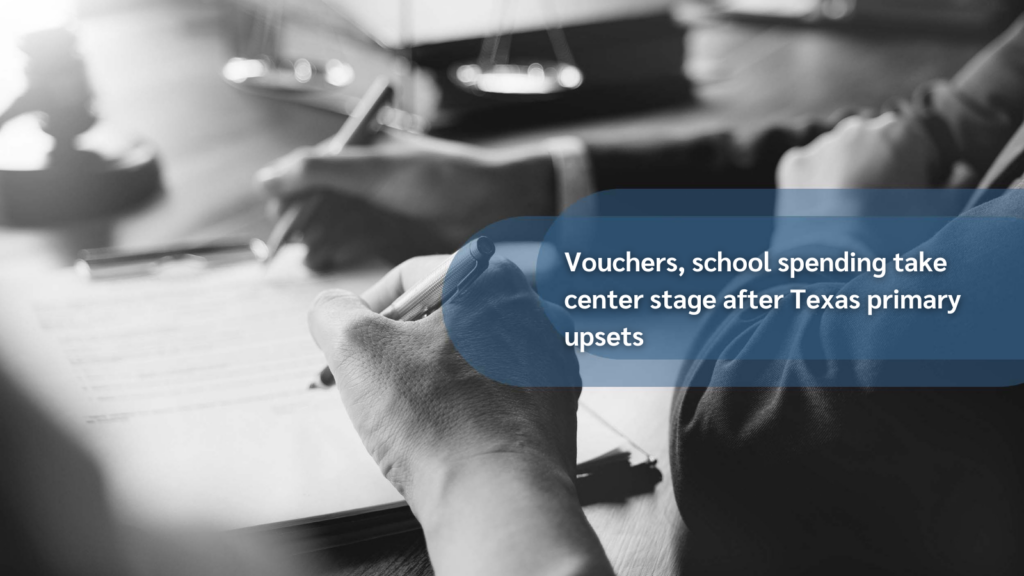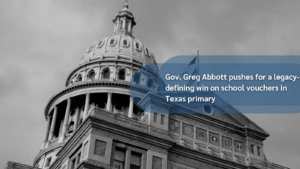Last year, two dozen Texas House Republicans were celebrating their opposition to private school vouchers with pins that said “24” and “Texas schools” over a silhouette of the state.
The pins were to commemorate their solidarity and remind them to continue to stand together.
But after a wave of special sessions, unprecedented political pressure from Gov. Greg Abbott and millions of dollars in campaign spending from wealthy donors, their ranks have been gutted, and the question of vouchers appears no longer if, but when and to what degree.
Of the 24 holdouts, just six who stood firm against school vouchers won reelection last week, with four others heading to runoff elections May 28. In each of those four, Abbott will support their challengers, making it an uphill climb for reelection.
“There was this bloc of rural Republicans who essentially held the cards in terms of success or failure for school choice legislation,” said John Colyandro, a pro-voucher lobbyist who previously served as Abbott’s policy director. After the runoffs, “you’ll have at least 12, if not 15 new pro-school choice members.”
The Legislature isn’t scheduled to meet again until January, at which point there will likely be enough House members to pass a voucher bill in the chamber for the first time.
And with enough members on board, there won’t be the same urgency for Abbott to negotiate on important education policy proposals that he had used as bargaining chips — including teacher pay raises, elimination of the STAAR tests and billions of extra school dollars. With Tuesday’s results likely breaking the decadeslong blockade on vouchers, the fate of those other policies is now in flux.
In the climax of the voucher fight last year, most of the Republican holdouts voted with Democrats to strip vouchers from a broader bill that included those other, widely popular education items — effectively dooming the legislation.
Ironically, they may now get their wish to disentangle the two.
“Texans are one step closer to empowering every Texas family,” Abbott said after Tuesday’s election results. “Republican primary voters have once again sent an unmistakable message that parents deserve the freedom to choose the best education pathway for their child.”
Abbott’s office did not respond to requests for comment, but lobbyists and advocates on both sides of the voucher debate said they expect a standalone bill next time, likely resembling last year’s voucher proposals that would have provided about $10,500 per child to be used on educational expenses including private school tuition, transportation, uniforms, tutoring or others.
Half a billion dollars was set aside for a voucher program in last year’s school budget, with an additional $4 billion for public schools, but that $4.5 billion will be freed up next year to be spent however the next Legislature wishes.
House Bill 1 “was truly a piece of compromise legislation that these Republicans and all Democrats opposed because of the school choice component,” said Nathan Cunneen, a political strategist with the pro-voucher American Federation for Children. Proponents often refer to the vouchers as “school choice” because they would allow families to use public dollars for private education that may otherwise be unaffordable.
“The degree to which compromise is necessary now is unclear,” Cunneen said.
Although Abbott has criticized public schools as hotbeds of “indoctrination,” he also has boasted about boosting their budgets and has pledged to keep them “fully funded” if a voucher program is enacted.
There is a broad consensus in Austin that teachers should get raises, that the special education funding system and school funding formulas need reforms, and that the STAAR tests need to be tweaked or eliminated, Colyandro said. He expects each of those to pass in the 2025 legislative session.
“This almost binary choice that you can do something more for the pub ed system or you’re for school choice, that’s just a false choice,” he said.
Advocates of traditional public schools — who oppose vouchers because they believe they unfairly defund school districts — noted that vouchers are not inevitable. There’s no political mandate for the policy, they said, as voters were misled by dishonest messaging and huge amounts of outside spending. And there is still time before the Legislature reconvenes.
But even those advocates admit that things aren’t looking good.
“If we were to magically say all the people who were elected last Tuesday were now actually in office and we’re starting session tomorrow, then yes I think that it would be very likely that they would just do whatever Abbott asked them to do,” said Monty Exter, a lobbyist with the Association of Texas Professional Educators. He added that there are still unknowns, such as whether Abbott was tapped for a role in a possible second Trump administration.
Exter said he doesn’t see extra public school funds, teacher pay raises and other education policy proposals as a priority for the governor now, other than as a sweetener for vouchers.
“I don’t think that any of the people that were just elected need a carrot in order to pass that voucher bill,” Exeter said.
HD Chambers, executive director of the Texas School Alliance, which represents 46 of the state’s largest school districts, said school leaders are still processing Tuesday’s election results, although they are an undeniable disappointment.
“Many of the House members that we felt had supported good public ed policy were defeated,” he said, adding that this has “changed the dynamics” of the conversation around school vouchers in the Texas House, making eventual passage more likely.
“Is the handwriting on the wall? It doesn’t seem unreasonable to say that’s the case, yes,” Chambers said. “But I also think there’s additional discussions and conversations to be had that would help shape, form opinions that would ultimately lead to whatever that body’s policy would look like.”




